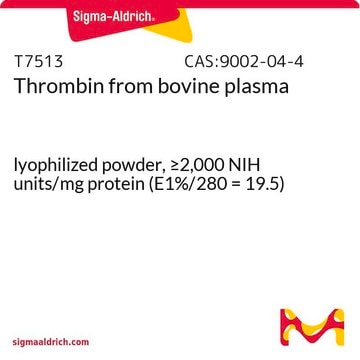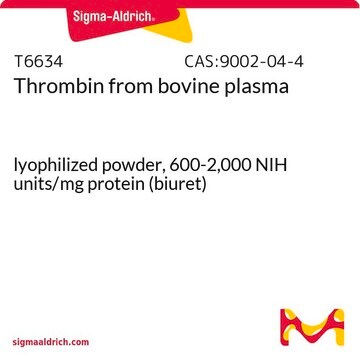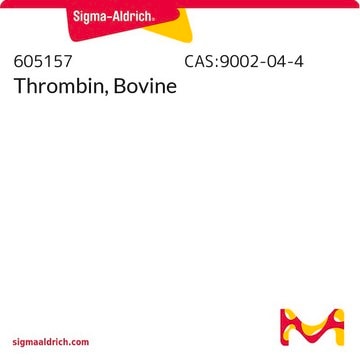1.12374
Thrombin
from bovine plasma, 50 NIH units/mg dry wt
Synonym(s):
Thrombin, Coagulation factor IIa, Fibrinogenase
Sign Into View Organizational & Contract Pricing
All Photos(1)
About This Item
Recommended Products
biological source
bovine plasma
Quality Level
form
solid
specific activity
50 NIH units/mg dry wt
storage temp.
2-8°C
General description
Thrombin, a glycosylated sodium-activated type II enzyme, is also called coagulation factor IIa. It contains two anion-binding exosites, ABE-I and ABE-II. Thrombin exists as α, β, and γ isoforms at different stages of its generation. Bovine a-thrombin consists of a light chain (A chain) and a heavy chain (B chain). These two chains are joined by one disulfide bond.
Application
Thrombin has been used in flow cytometry analysis to investigate the basal activation level of circulating platelets in mice. It has also been used to coagulate the plasma and allow the organotypic slice to adhere to the coverslip during culturing.
Biochem/physiol Actions
Thrombin is a serine protease critical in the blood clotting process and activates clotting factors V, VIII, XI, and XII. It mediates the conversion of inactive plasma protein fibrinogen (factor I) into biologically active fibrin. Thrombin acts as a pro-coagulant and promotes platelet aggregation. It can also produce anti-coagulant effects. It is used to treat bleeding from capillaries and small venules. During vascular injury, thrombin is crucial for controlling the macrophages, neutrophils, monocytes, SMC, and dendritic cells.
Analysis Note
Appearance (colour): almost white
Appearance (description): powder
Activity (fibrinogen; pH 7.6; 37 °C): ≥ 50 U/mg
Appearance (description): powder
Activity (fibrinogen; pH 7.6; 37 °C): ≥ 50 U/mg
signalword
Danger
Hazard Classifications
Eye Irrit. 2 - Resp. Sens. 1 - Skin Irrit. 2 - STOT SE 3
target_organs
Respiratory system
Storage Class
11 - Combustible Solids
wgk_germany
WGK 1
flash_point_f
Not applicable
flash_point_c
Not applicable
Certificates of Analysis (COA)
Search for Certificates of Analysis (COA) by entering the products Lot/Batch Number. Lot and Batch Numbers can be found on a product’s label following the words ‘Lot’ or ‘Batch’.
Already Own This Product?
Find documentation for the products that you have recently purchased in the Document Library.
Customers Also Viewed
Our team of scientists has experience in all areas of research including Life Science, Material Science, Chemical Synthesis, Chromatography, Analytical and many others.
Contact Technical Service










